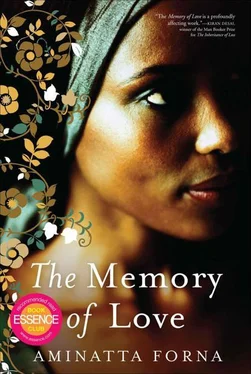Actually I haven’t done too much travelling. Money was short at the beginning. Also, my travel was restricted because of the way I entered the US. But it will be different for you. So now I guess I’m waiting, my friend. There’s a lot to see just around here. My first few months, man, I went around with my eyes popping. I don’t go out so much these days, but we can hit the town a few nights .
Am sitting here wondering why I haven’t heard from you. Flash me and I can call you back. Or tell me when is a good time to call. It’s expensive, I know. Don’t worry about the money, let me call you. As soon as you get this letter. It would be good to hear your voice .
Take care, man ,
Tejani
Three times now Andrea Fernandez Mount had written to remind Kai he needed a medical, proof of his good health being the only remaining bar to his deliverance to the United States. She’d also written to tell him of his successful pass at the English proficiency test. So, he’d thought to himself, he could speak English after all. Well, that was always good to know. Kai turned the letters into a boat, an aeroplane and a pineapple and placed them upon the windowsill in his bedroom.
‘Mansaray.’
Kai folds Tejani’s letters across the same dirt-lined creases, returns them to his back pocket and follows the doctor into the room. The doctor is a man in his fifties, grey-haired, dignified and tired. He reads the letter Kai had given to the nurse. If he is surprised by the contents, it does not show.
‘Take a seat.’
Kai sits.
‘How do you feel?’ he asks. ‘Everything OK?’
‘Yes.’
‘No complaints?’
‘None.’
The doctor signs the bottom of a typed form and hands it to Kai.
‘Is that it?’ asks Kai.
‘What more do you want?’ The doctor shrugs.
Kai stands. The doctor follows him to the door and calls the next patient.
In the street Kai hails a taxi. Time is short. A cab pulls over and he checks the driver’s route, squeezes in next to the other passengers. At the US Embassy he drops down, enters the building, says to the marine, ‘Miss Fernandez Mount, please.’
The rains are over, seemingly fled the skies. Adrian feels the relief. The tide of red silt has cleared from the sea. The traffic speeds, the people slow. Today the patients are out in the sun raking the newly cut grass, a line of eight men bent at the waist. From his office Adrian watches Salia watching them, arms crossed, legs apart, white uniform spotless. At that moment Salia looks up, sees Adrian and raises a hand in salute. Adrian waves back. He turns away from the window.
Somewhere out there in this city is Mamakay. What is she doing? He imagines her in the crowds at the market, searching out bargains among the stalls. In the mornings he encourages her to spend the money he has given her to furnish the house. But she moves slowly and reluctantly, and Adrian waits for her the way he has learned, like a horse whisperer, with his back half turned.
He is happy. The new house, modest, white-painted but with good floors and a small garden, became theirs for a modest rent three weeks ago. The balcony at the back faces the mouth of a small river. Adrian worried about mosquitoes, but Mamakay assured him there would be none, and in this matter she has proved correct.
He is happy. Each morning he wakes up to absorb the fact of his new life. A week last Wednesday, outside a supermarket, he saw the deaf boy again, the boy he had first seen at the police station, arrested for who knew what reason. The boy had recognised him. Adrian gave the boy a coin. The boy pressed the fingers of both hands against his lips, gestured towards Adrian and smiled. He watched the boy run back to his friends. When they’d first met, he and the boy, Adrian had been a different person. He feels this so strongly he wonders how the boy had even recognised him.
He is happy. Except in those moments when he thinks of Kate and Lisa; a jolt from his conscience surges through his body hot like electricity. He looks in the mirror and sees the traces of grey which his hair has held for years, the two vertical lines between his eyebrows. He wonders how he can be doing what he is doing. At those times he hides himself from Mamakay, for fear of allowing her to see what he sees, that he is undeserving.
At night he and Mamakay read together, out of necessity making their own simple entertainment. They talk and play cards. Once Mamakay brought out a Ludo board, at once a reminder of Kai. Adrian pictured Kai, his erratic beard, too youthful to grow into a full beard. Jealousy like a snakebite to Adrian’s heart. For some reason he found himself pretending he knew nothing of the rules of Ludo. He used it as an excuse not to play.
Last evening she lay on her back listening while he read aloud from a book and rubbed scented oil into the skin of her stomach with slow circular movements. From outside came the sounds of the mosque, of the football match playing at the video centre. Like a child she can hear the same story time and time again, though unlike a child she might snatch the paperback from his hand and read a section for herself, improving upon his inflection. She has a gift for it. Like a child she knows sections of the narrative by heart. ‘ “They say when trouble comes close ranks,” ’ she says in an accent incorrectly, yet somehow appropriately, of the Deep South. She has read Wide Sargasso Sea four times, though never Jane Eyre . He makes a promise to himself that he will find her a copy, it will be a gift, though he has no idea where he might find a Victorian novel in this city. He stores them up, these future gifts, in his mind, moments to be spun out into the future. He leans across and places the palm of his hand flat on her stomach. He thinks he feels the child inside, though it is but the shadow of her heartbeat.
Once she gave him a gift of her own. A miniature bottle of indigo pigment she’d found in a market a long time ago. The bottle had attracted her, tiny, sealed with lead, never opened. He wears it on a leather cord around his neck, tucked inside the breast pocket of his shirt. He tells himself that if he falls the glass will pierce his heart.
Most often the fear comes at night. He leaves the bed and wanders through the empty house. The electricity supply is erratic and means he must light a candle or else rely upon the moon. In those dark moments he thinks of the scale of what has been sacrificed, of Kate and Lisa, of the worst that could yet happen, that happiness such as this cannot last. He moves through the rooms and returns to bed, counting steps, counting seconds. When he slips back into bed alongside her, the fear lies low, below the surface.
One night he dreams he has lost her and wakes full of anguish. Her side of the bed is empty. When he finds her at the back of the house talking to a neighbour, absurdly anger comes as strongly as relief, that she should abandon him during his nightmare.
He watches her to see if he can catch a glimpse of what she is feeling. He sees her pleasure at his arrival, at his embrace, his small gifts and compliments. He sees no fear at all. And he asks himself, can this be so? Perhaps she does not love him. For she has never said she does and still does not talk about the future.
On Monday, three days from now, he has an appointment with Elias Cole. He has seen the old man twice since he arrived back in the country, though on neither occasion had much of consequence been said. Cole is dying. In the time Adrian had been away his condition had deteriorated again, the oxygen concentrator brought back to his room for the final road. There has been no reconciliation with Mamakay, for which Adrian considers himself responsible. It had been a disappointment when Cole declined to call for him. Adrian has become genuinely interested in the outcome, in getting to the point of Elias Cole.
Читать дальше












